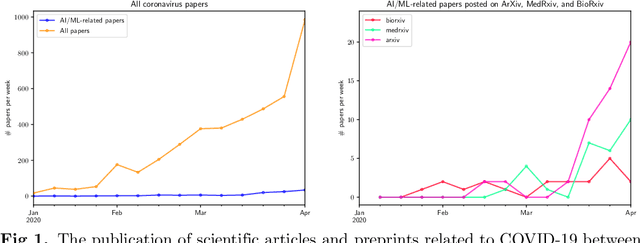Cynthia Sin Nga Lam
Ensuring the Inclusive Use of Natural Language Processing in the Global Response to COVID-19
Aug 11, 2021Abstract:Natural language processing (NLP) plays a significant role in tools for the COVID-19 pandemic response, from detecting misinformation on social media to helping to provide accurate clinical information or summarizing scientific research. However, the approaches developed thus far have not benefited all populations, regions or languages equally. We discuss ways in which current and future NLP approaches can be made more inclusive by covering low-resource languages, including alternative modalities, leveraging out-of-the-box tools and forming meaningful partnerships. We suggest several future directions for researchers interested in maximizing the positive societal impacts of NLP.
Considerations, Good Practices, Risks and Pitfalls in Developing AI Solutions Against COVID-19
Aug 13, 2020
Abstract:The COVID-19 pandemic has been a major challenge to humanity, with 12.7 million confirmed cases as of July 13th, 2020 [1]. In previous work, we described how Artificial Intelligence can be used to tackle the pandemic with applications at the molecular, clinical, and societal scales [2]. In the present follow-up article, we review these three research directions, and assess the level of maturity and feasibility of the approaches used, as well as their potential for operationalization. We also summarize some commonly encountered risks and practical pitfalls, as well as guidelines and best practices for formulating and deploying AI applications at different scales.
* 4 pages, 1 figure
Mapping the Landscape of Artificial Intelligence Applications against COVID-19
Apr 23, 2020
Abstract:COVID-19, the disease caused by the SARS-CoV-2 virus, has been declared a pandemic by the World Health Organization, with over 2.5 million confirmed cases as of April 23, 2020. In this review, we present an overview of recent studies using Machine Learning and, more broadly, Artificial Intelligence, to tackle many aspects of the COVID-19 crisis at different scales including molecular, clinical, and societal applications. We also review datasets, tools, and resources needed to facilitate AI research. Finally, we discuss strategic considerations related to the operational implementation of projects, multidisciplinary partnerships, and open science. We highlight the need for international cooperation to maximize the potential of AI in this and future pandemics.
 Add to Chrome
Add to Chrome Add to Firefox
Add to Firefox Add to Edge
Add to Edge